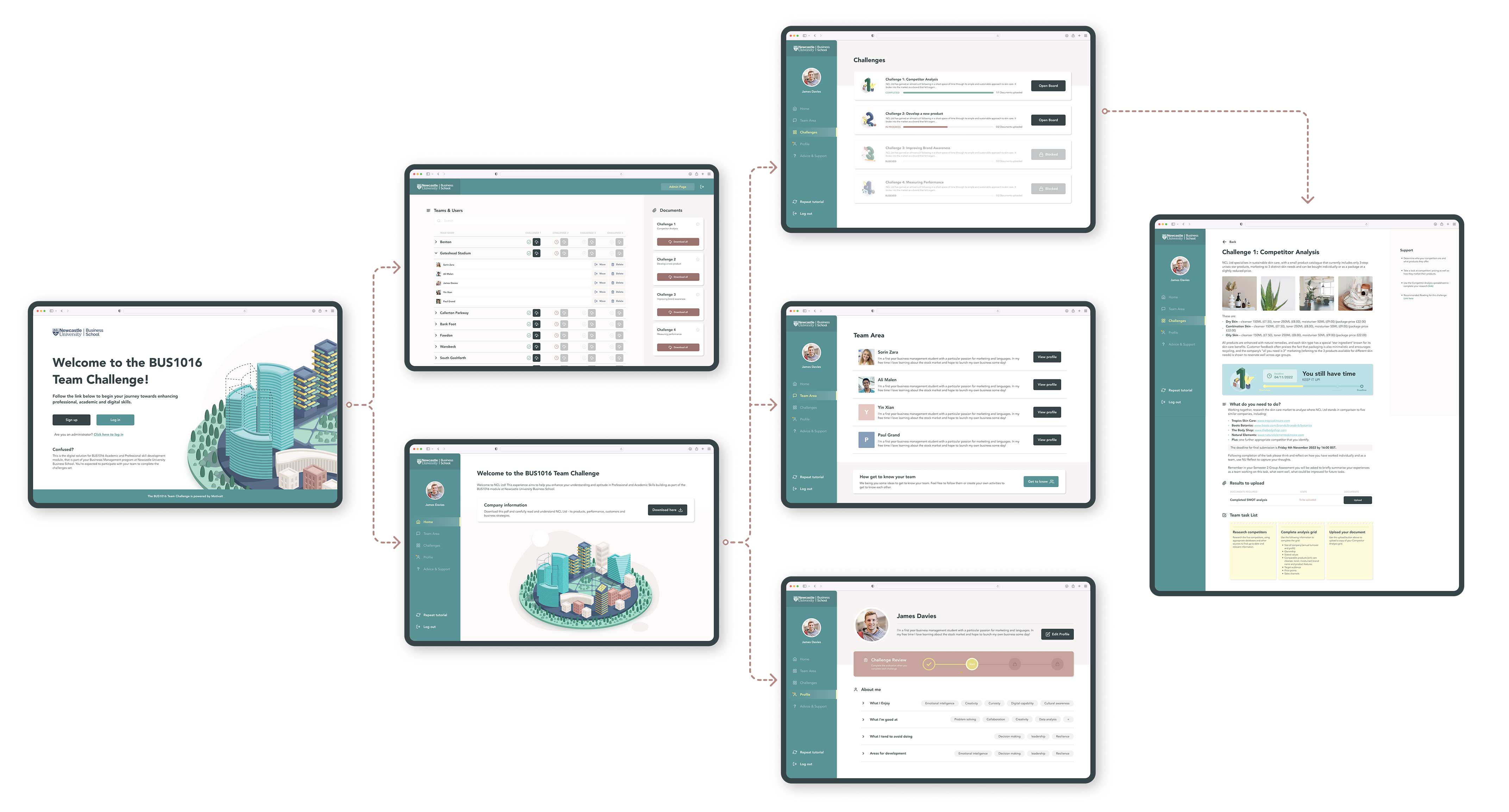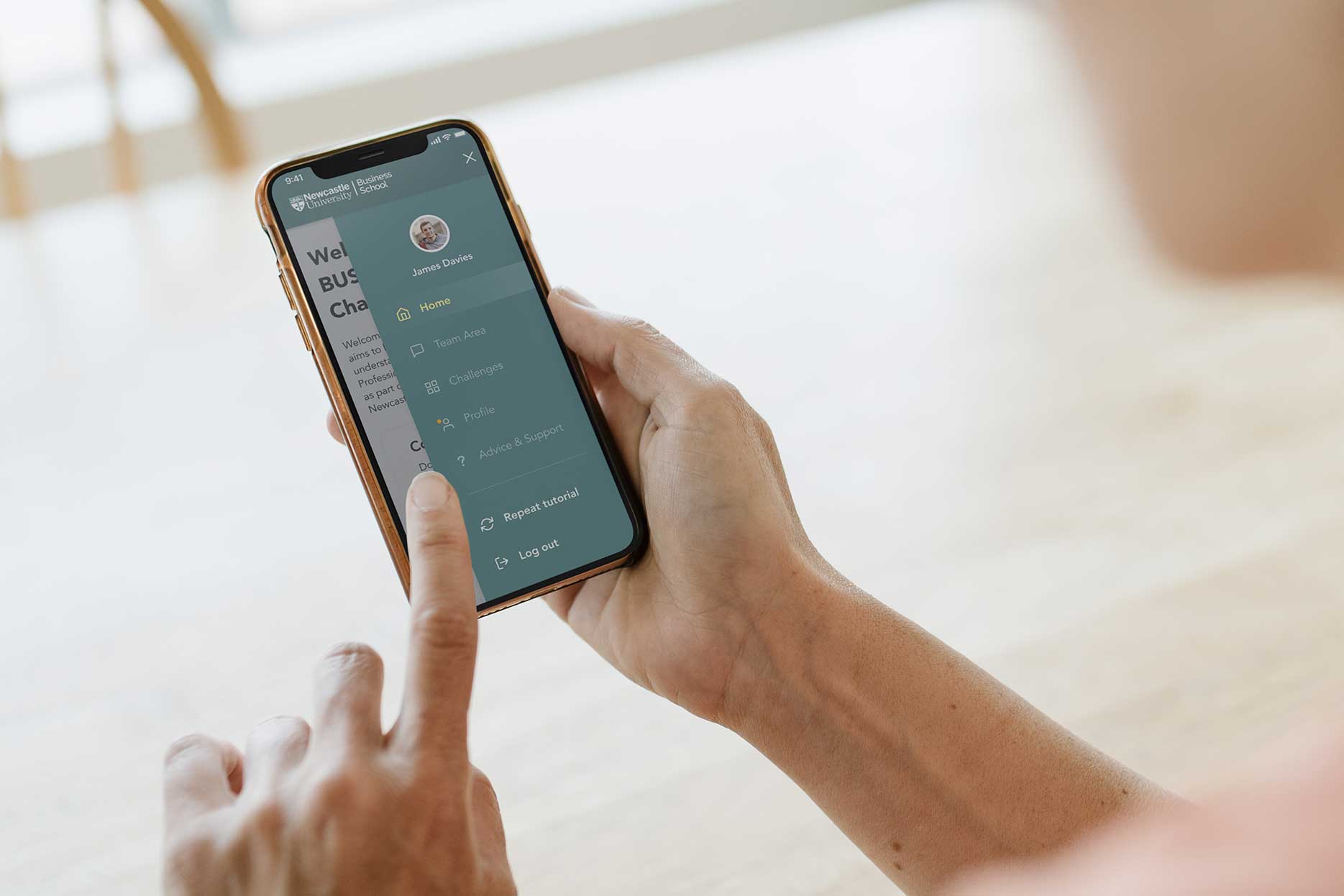The Client: Newcastle University Business School
The triple-accredited Newcastle University Business School hosts over 3,500 students representing 89 nationalities. Part of the UK’s elite Russell Group, they inspire new global perspectives in the Future of Work and Leading on Leadership through vibrant collaboration. They drive excellence in research, innovation and education to create opportunities for their students, staff and partners to shape a responsible future for business and society. Their student experience is renowned for prioritising the needs of students and their personal and professional growth. Newcastle University Business School’s reputation for excellence hinges on the school not only having expert teaching staff but innovative and engaging learning tools and facilities that provide students with a unique and enriching education.
Digital Learning to Enhance the Learning Process
Online educational tools can vary depending on their intended use and can take various forms such as business simulations, gamified solutions and learning management systems. Blended learning approaches, that integrate technology with traditional instructor-led classroom activities, have been shown to increase engagement across learners. Gamification has also been shown to raise engagement and combining these is a great way to encourage collaboration, enhance engagement and teach wider skills relating to the world of work. The use of new technologies in learning can also be a valuable way to ensure learning is more inclusive, engaging and unique – especially adapting to new needs and expectations post-pandemic.
The Challenge
Recognising the impact that digital solutions can have on the student learning process formed the basis of our initial conversations with Newcastle University Business School, who had a desire to digitally enhance their module for First Year students, BUS1016 (Academic and Professional Skills Development). Many of the practices and skills that the module focuses on can often feel intangible to students being introduced to new environments and situations for the first time. New information to learn, new approaches to learning, and new challenges and opportunities to navigate as young adults personally and professionally.
Particularly following time spent in lockdown, many students arrive at university coming from vastly different backgrounds and previous teaching experiences. The pressure is on, more than ever, for universities and other advanced education groups to develop more varied channels and pathways that can support all needs and sustain interest as part of delivering a rich learning experience.
The team behind the module BUS1016 at Newcastle University Business School were interested in finding ways to immerse students in some of the nuance and practicalities behind the world of work and business, and having seen the positive responses previous students had to other simulations, they approached Motivait to design something bespoke to their needs. The core need was to provide a platform or environment that could introduce themes from the module to students while, crucially, getting them to work together. By using the solution, students would be engaged in learning about professional and academic skills but to also enhance and develop their teamwork and collaborative skills as well.
The key objectives at the heart of this project were:
- Drive positive teamwork and collaboration across the student population taking the BUS1016 module;
- Foster student confidence, understanding and awareness in core academic and professional skills and desired behaviours;
- Encourage autonomous and independent learning; and
- Introduce best practices and relevant approaches to common business challenges.
The Solution: The BUS1016 Team Challenge
We proposed designing and developing an intuitive simulation style, web-based solution with responsive design which was accessible via mobile, tablet and desktop. The solution integrates the in-person teachings of theory-based content, with accompanied reading materials, and the practical application of theory through a business simulation designed, developed and managed by Motivait.
Running through the solution, the simulation narrative places students within a fictitious company based in Newcastle and sets them specific challenges relating to the company’s operations and products. The different teams are allocated the same challenges, provided with information and context on the company and are required to work together to produce correlating assignments for assessment by their tutors. For instance, the first challenge requires the students to collaborate on analysing competitor information. The next challenges follow the progression of the business asking students to design, develop and market a new product, while analysing the impact of their decisions, learning practical skills that will be important for future employability and other university work.
Through these challenges, students are prompted to improve their communication and collaboration skills as well as gain experience with independent learning, set against the realities and practicalities of the business world.
“It has been an enjoyable and rewarding experience to work with the team at Motivait who deliver a wonderful combination of professionalism and approachability. They have been efficient and timely in their response, demonstrating great creativity and problem solving to design and deliver a bespoke educational platform for our students. We look forward to further developing our relationship with Motivait as our needs evolve and develop.”
– Dr. Angela Mazzetti, Senior Lecturer in Management Practice & Degree Programme Director
Development
The whole solution was designed, developed and deployed within five months, ensuring it was live and accessible to all relevant students by the time their term started in October.
Some key challenges identified at the start of the process were:
- A Standalone simulation: Strict cyber security requirements that meant the solution would be best placed outside of existing university tools and platforms. It was then up to Motivait’s team to keep the solution feeling intuitive to use and avoid any major disconnects as students moved between screens, tabs, or documents while in the experience.
- The Importance of Accessibility: The need to take into account ranging competencies and language barriers as a result of students arriving to the Business School from a range of backgrounds and learning needs.
- Delivering Learning: Not losing focus on adequately guiding and preparing students towards their final assessment.
UK Offices
Newcastle
The Core 5.22
Newcastle Helix
Bath Lane
Newcastle upon Tyne
NE4 5TF
+44 191 495 7340
Spain Offices
Madrid
Av. de Bruselas, 13
Ed. América
28108 Alcobendas
+34 91 425 86 57





